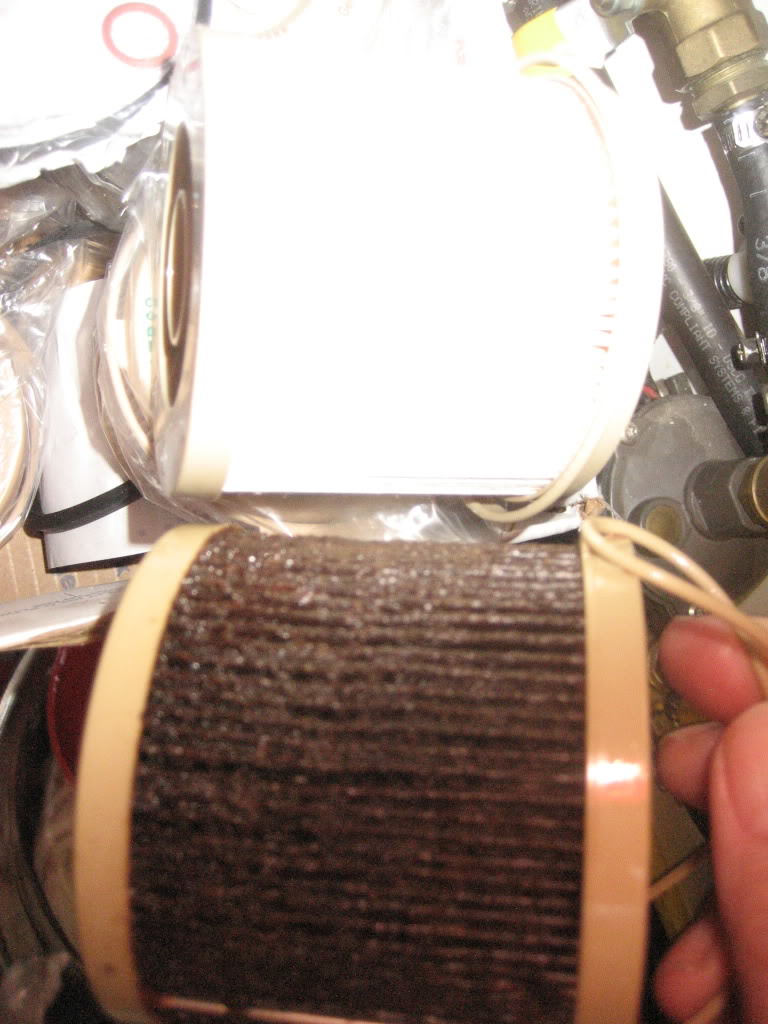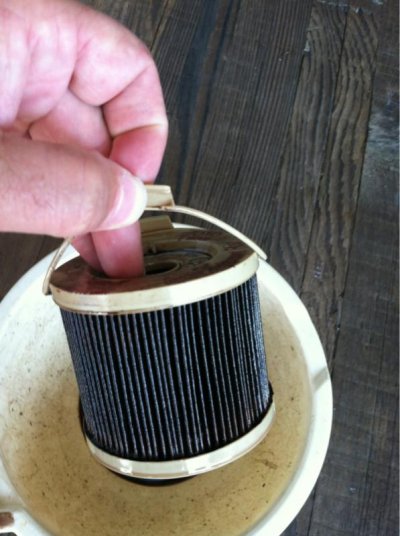DonnyP
Veteran Member
I wanted to share an experience we had on our first weekend trip with our new boat, Longfellow. It's a story, an experience and a recommendation.
Longfellow is a 41' Cheer Men PT41, and is our first boat He has twin Ford Lehman 120s with canister type FRAM fuel filters just off the tanks and the original PITA duel on-engine filters. The boat had been on land for 2 years and was likely not used much for a year or two more. The tanks were full. Sea Trial was in 20+ kts of wind and ~2' chop. All went very well. We asked the yard to check all of the systems, change all fuel filters, and purchase spares for all. We bought Longfellow in early spring and were the first on our docks in Newburyport, MA after a great 10hrs from South Freeport, ME with my dad.
He has twin Ford Lehman 120s with canister type FRAM fuel filters just off the tanks and the original PITA duel on-engine filters. The boat had been on land for 2 years and was likely not used much for a year or two more. The tanks were full. Sea Trial was in 20+ kts of wind and ~2' chop. All went very well. We asked the yard to check all of the systems, change all fuel filters, and purchase spares for all. We bought Longfellow in early spring and were the first on our docks in Newburyport, MA after a great 10hrs from South Freeport, ME with my dad.
Our first trip was to Gloucester, MA through the Annisquam River. Just as we were coming into the (tight) main channel, a giant sport-fish went by and really rocked us. We instantly lost the port engine. I swung around and headed back out into Ipswich Bay. The engine started back up and we turned back around and went through the Annisquam River without any other issues. Tied up in Gloucester and had a great dinner at the Franklin Cafe.
We left mid-morning the next day, deciding to go out of Gloucester Harbor and around Rockport, MA, before heading back to Newburyport. This is a little longer than through the river, but on a nice day is also a beautiful ride. Just as we left the harbor, the port engine died again. I could not restart it. It was a nice day and the tides were right, so we decided to continue home on the starboard engine. Probably my best docking of the season...
I likely have two issues now. Clogged fuel filters and crappy fuel. The day before a big nor'easter I decide to replace all fuel filters incase the storm is going to be bad and I need to move the boat. Our particular dock is open to swells on a strong east-northeast wind. All filters replaced, lines bled, no luck. I could not restart either engine now:-( After 8 hours in the engine room, the storm coming in, and the dock master wanting to move boats to open docks further up river, I decided to test out my shiny new TowBoat US card. They were great and got me secured for the storm.
I had a mechanic check out my filter job and determine I had put the filter gasket on top of the filter element instead of under the filter housing. To me, it was all going in the same spot....Apparently I blocked the filter with the gasket and fuel was not flowing. Lesson learned, engines running.
I still have 200+/- gallons of questionable diesel on board. After talking with several people I decided to call John at Dr. Fuel (www.drfuel.com 617-529-1961). They have a portable fuel polishing and tank cleaning system. The pump/filter system is on a 2-wheel dolly. They pump all of the fuel into 55 gal drums on the dock. They go into the tank through access ports and clean it as best as possible. They cycle fuel through to try to get as much sludge that they cannot reach by hand. Then they pump all of the fuel back onto the boat through their filter system (i forget the microns?). We lost about 15 gallons from the sludge and what the filters picked up. He treated the fuel for full tanks and I headed to the fuel docks to top off. I have no affiliation to Dr. Fuel, they are a great company, cover a huge part of the Eastern US, are very clean, and charged a fair price.
I put about another 20 hrs on the engines and changed all the filters again. This time the bleed screw on one of the filter housings would not stop leaking and finally stripped. After purchasing a new housing from American Diesel, we ran the rest of the summer without leaks or other issues. I am a little below half tanks now. Time to top off, treat it, and put Longfellow to bed for the winter.
-Donny
Longfellow is a 41' Cheer Men PT41, and is our first boat
Our first trip was to Gloucester, MA through the Annisquam River. Just as we were coming into the (tight) main channel, a giant sport-fish went by and really rocked us. We instantly lost the port engine. I swung around and headed back out into Ipswich Bay. The engine started back up and we turned back around and went through the Annisquam River without any other issues. Tied up in Gloucester and had a great dinner at the Franklin Cafe.
We left mid-morning the next day, deciding to go out of Gloucester Harbor and around Rockport, MA, before heading back to Newburyport. This is a little longer than through the river, but on a nice day is also a beautiful ride. Just as we left the harbor, the port engine died again. I could not restart it. It was a nice day and the tides were right, so we decided to continue home on the starboard engine. Probably my best docking of the season...
I likely have two issues now. Clogged fuel filters and crappy fuel. The day before a big nor'easter I decide to replace all fuel filters incase the storm is going to be bad and I need to move the boat. Our particular dock is open to swells on a strong east-northeast wind. All filters replaced, lines bled, no luck. I could not restart either engine now:-( After 8 hours in the engine room, the storm coming in, and the dock master wanting to move boats to open docks further up river, I decided to test out my shiny new TowBoat US card. They were great and got me secured for the storm.
I had a mechanic check out my filter job and determine I had put the filter gasket on top of the filter element instead of under the filter housing. To me, it was all going in the same spot....Apparently I blocked the filter with the gasket and fuel was not flowing. Lesson learned, engines running.
I still have 200+/- gallons of questionable diesel on board. After talking with several people I decided to call John at Dr. Fuel (www.drfuel.com 617-529-1961). They have a portable fuel polishing and tank cleaning system. The pump/filter system is on a 2-wheel dolly. They pump all of the fuel into 55 gal drums on the dock. They go into the tank through access ports and clean it as best as possible. They cycle fuel through to try to get as much sludge that they cannot reach by hand. Then they pump all of the fuel back onto the boat through their filter system (i forget the microns?). We lost about 15 gallons from the sludge and what the filters picked up. He treated the fuel for full tanks and I headed to the fuel docks to top off. I have no affiliation to Dr. Fuel, they are a great company, cover a huge part of the Eastern US, are very clean, and charged a fair price.
I put about another 20 hrs on the engines and changed all the filters again. This time the bleed screw on one of the filter housings would not stop leaking and finally stripped. After purchasing a new housing from American Diesel, we ran the rest of the summer without leaks or other issues. I am a little below half tanks now. Time to top off, treat it, and put Longfellow to bed for the winter.
-Donny



